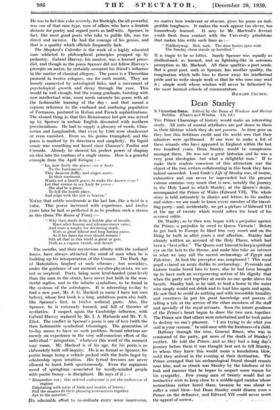Dean Stanley
A Victorian Dean. Edited by the Dean of Windsor and Hector Bolitho. (Chatto and M'indus. 12s. Ed.) Tut: Prince Charmings of history would make an interesting study. All sorts of mental attributes are put down to them in their lifetime which they do not possess. As time goes on they lose this fictitious credit and the world sees that their admirers were spellbound. If one were to. make a list of these wizards who have appeared in England within the last two hundred years, Dean Stanley would be conspicuous amongst theni. He was not a great historian and he was a very poor theolOgian—but what a delightful man ! If to Make their readera conscious of this attraction was the object of the two writers collaborating in this book they have indeed succeeded. Lord Ernle's Life of Stanley was, Of course, exhaustive and can never be superseded but the present volume contains very much that is new, notably the journey to the Holy Land in which StanleY, at the 'Queen's deiire, accompanied the Prince of Wales (Edward VII). The whole story is told intimately in diaries and letters to his mother and sister—we are made to know every member of the travel- ling party—and, incidentally, we get a picture of Edward VII at the age of twenty which would soften the heart of his severest critic.
Dr. Stanley, as he then was, began with a prejudice against the Prince, a prejudice he Owed to 'Queen Victoria ! Before he got back to Europe he liked him very much and on the liking he built in after years a real affection. Stanley had already Written an account of the Holy Places, which had been a "best seller." The Queen sent him out to keep a spiritual -eye on the heir to the throne, and make him take art. interest in what we may call the sacred archaeology of Egypt and Palestine. At first the preceptor was nonplussed ! This royal pupil evinced an acute dislike to archaeology-. Pyramids and historic tombs bored him to tears, also he had been brought up to have such an overpowering notion of his dignity that when the party met together at meals no one spoke above his breath. Stanley had, as he said, to lead a hbrse to the water who simply would not drink and to lead him again and again. He saw that he could do nothing and with irresistible humility and sweetness he put his great knowledge and powers of telling a tale at the service of the other members of the staff and specially of the royal servants. Soon the innate goocbiess of the Prince's heart began to draw the two men together. The Prince saw that others were entertained and he took pains to destroy no one's pleasure. " I am trying to do what you said in your sermon," he said once with the frankness of a child.
Halfway through the tour, General Bruce, who was in command of the party, got news of the death of Stanley's mother. He told the Prince, and as they had a long day's journey before them it was thought best not to tell Stanley, to whom they knew this would mean a knockdown blow, until they arrived in the evening at their destination. The Prince arranged that Isis archaeological friend should remain near him, and so struck was Stanley by the kindness of his look and manner that he began to suspect -some reason for his sympathy. Few young. men of twenty would feel an instinctive wish -to keep close to a middle-aged mentor whose instructions rather bored them, because he was about to suffer a cruel blow—but Dean Stanley could disarm even a Prince on the defensive, and Edward VII could never resist
the appeal- of sorrow, , . -






































 Previous page
Previous page